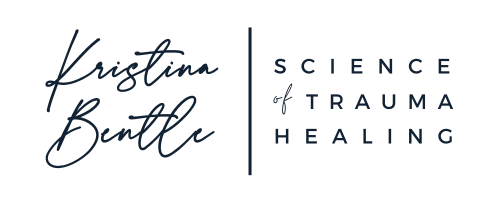
Hello, I'm Kristina Bentle
Author, speaker, researcher, scholar, trauma thriver, and life-long learner.
I am an advocate for holistic healing. My work focuses on neuroscience and trauma, chronic stress, and the path to full healing and improving quality of life.
Trauma is far more common than you think
How many of these symptoms have you experienced? Or are you experiencing?
- Intense emotions or numbing
- Disturbed sleep patterns or insomnia
- Chronic fatigue or exhaustion
- Muscle tension, aches, or chronic pain
- Difficulty concentrating or memory problems
- Avoidance of social interactions or withdrawal
- Struggle with a negative inner voice
In truth, trauma impacts all of us.
The person sitting next to you on the bus, your neighbor across the street, or even a fellow shopper at the grocery store…
Many people we encounter in our daily lives carry with them hidden fragments of their stories, some of which may still cause deep pain. However, it is often the case that we hide these human experiences from the very thing that can help us heal: connection.
These pieces are buried beneath layers of everyday interactions, significantly impacting our happiness, productivity, and overall quality of life.
The smiles we exchange and the small talk we engage in mask our deeper struggles. Casting a shadow over our well-being, affecting our ability to find joy, maintain focus, and build fulfilling connections.
Overlooked sources of trauma that have a profound impact
- Chronic pain that creates emotional distress and disruptions to daily life.
- Prolonged financial struggles, such as poverty, homelessness, or bankruptcy.
- Uncertainty and loss of financial security and stability.
- Workplace bullying, harassment, or toxic environment.
- Unexpected or traumatic medical procedures.
- Persistent experiences of discrimination, microaggressions, or marginalization based on race, gender, sexuality, or other identities.
- Significant life transitions or events that challenge one’s sense of identity, such as retirement, divorce, or immigration.

In the modern world,
the prevalence of trauma is likely far more common than we realize. Our society is bombarded with constant stimuli, high stress, pressure, and potential trauma. From news of global crises to everyday challenges like work pressures, relationship dynamics, and financial stressors, people are continually navigating situations that can overwhelm their coping mechanisms.
Plus, because of our fast-paced and interconnected world, it’s not uncommon for people to suppress their emotional responses and prioritize productivity or success. However, this can lead to chronic stress, burnout, and overall dissatisfaction with life, creating a culture of worsening trauma. Ironically, it leads to being less productive.
To make matter worse, we live in a world that is seemingly scared of the word trauma. Often associating it solely with the experiences of war veterans. While the trauma experienced by veterans is undoubtedly significant and deserving of attention, it represents only a fraction of the spectrum of traumatic experiences that individuals can endure.
It’s essential to broaden our understanding of trauma, break down the social stigma surrounding the associated physical and mental health issues, and recognize that it affects people from all backgrounds and walks of life. By breaking down these barriers and fostering a more compassionate and trauma-informed society, we can create spaces where individuals feel safe to acknowledge and heal from their experiences.
Trauma Statistics Currently Available
1 in 4 Globally
According to the World Health Organization (WHO), an estimated 1 in 4 people globally will experience a mental health disorder at some point in their lives. Trauma-related disorders, such as PTSD, are significant contributors to this statistic.
223.4 million people
According to the National Council of Wellbeing, 70% of adults in the U.S. have experienced some type of traumatic event at least once in their lives. That’s 223.4 million people.
Stigma and Shame
Chronic Stress
Robust evidence has linked the experience of chronic stress to onset of major depressive disorder (MDD), which is the leading cause of disability worldwide.
Women at Risk
PTSD and youths

Let's take a moment to imagine a world,
where we don’t shy away from trauma but instead embrace it as a transformative and healing experience. By recognizing trauma as a common truth, we can begin to see it as an opportunity for growth rather than a burden to bear alone.
When we approach trauma with empathy and understanding, we open ourselves to a world of healing and transformation. Let’s make a conscious effort together to raise awareness about human struggles and not treat them as something to be ashamed of, but rather as a stepping stone to a brighter and more fulfilling future.
Ready to work together?
Are you looking for...
Individual


